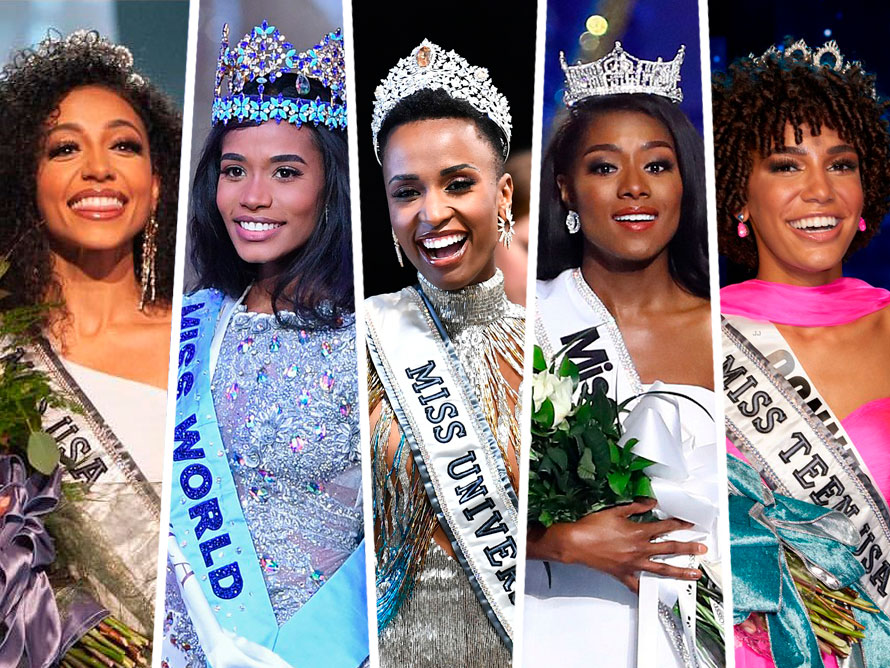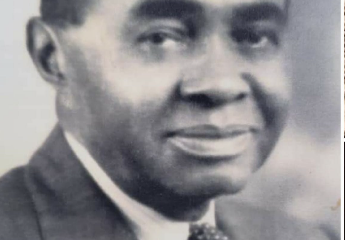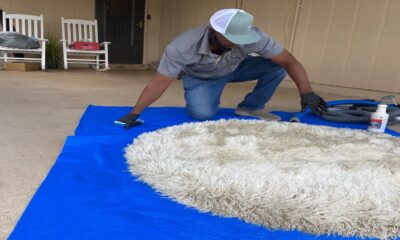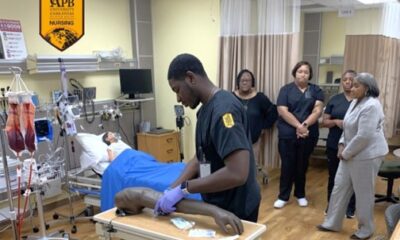Featured
Black is Beautiful and Five Queens Have the Crowns to Prove It

Young women from all around the nation are competing this week to become Nia Franklin’s successor, the New York native who became the 92nd Miss America. Franklin is Black as are Miss USA, Miss Teen USA, Miss Universe and Miss World. With Black women holding the crowns of the five major beauty pageants, any vestige of the outdated notion that Black women lack beauty and brains has been packed up and put away like an ill-fitting evening gown.
“These organizations are opening up to how much talent we have in every race,” said Shalexis Shelton, a 20-year-old who competed in the Miss Arkansas pageant last summer.
Shelton began competing in pageants to earn scholarship dollars to fund her college education. The aspiring health services administrator won a local contest which positioned her to participate over the summer in the Miss Arkansas pageant. Another contestant won the title, but Shelton is planning to keep “working and growing.”
She added, “The one lesson I’ve learned is to stay true to who you are. We all know that there is a stereotypical pageant girl that everyone has in mind when they are watching a pageant.”
Twenty years ago, Michelle Rudolph competed in the Miss Arkansas pageant and placed in the Top Ten. Today she travels the country as a judge in the Miss America and Miss USA pageants.
“It is such an exciting time as five major titles have been received by these beautiful, talented, intelligent, and socially conscience women,” Rudolph said. “The thing that I love the most about these young ladies is that they are all catalysts for making a powerful impact in the world and the crowns have given them a platform to not only talk about their winning, but it is a great tool for recruitment, not only for more African American women to get involved, but to open the conversation about pageants/scholarship competitions.”
Resting the Rap
Rudolph points out that pageants have often received a bad rap but sees a positive change in the dialogue.
“I think that pageants, even with the bad rap, still had a place in the American psyche…particularly for rating the attractiveness of women but also signaling to society what the idea woman is,” Dr. Nadia Brown, a professor at Purdue University, said. “While they had fallen out of vogue, I still think it dictates in some ways what we think is attractive.”
Brown, who studies Black women and politics, is writing a book titled “The Politics of Appearance for Black Women Candidates”. She recently conducted a focus group of Black women in Indianapolis, exploring the connection between confidence and electability.
“There was a conversation about a candidate who was described as a ‘middle-aged auntie’ with big curly hair, statement necklaces, and bright colors,” Brown shared. “But, when she ran for office, she straightened her hair and wore navy suits. She lost. She just carried herself differently when she didn’t carry herself with confidence. The group discussed, ‘Is this the right way to go about things? What’s the tradeoff?’”
Vote for the Magic
As a researcher, Brown is acutely aware of the dynamics surrounding the appearance of Black women.
“How do we think about the gold standard for what Black women should look like?” she queries. “Initially, it was the Clair Huxtable look in politics.”
An evolution is underway these days, and it is occurring from the voting booth to the pageant stage. Brown, who is also a mother of three little girls, is excited and taking note.
Shelton is also empowered by an apparent appreciation for “uniqueness.”
She said, “I have also learned that timing is everything. Just because your time isn’t right now doesn’t mean that it will never come.”
“What I’ve been thinking about is that all of us don’t look like Clair Huxtable, and some of us never will,” Brown stated. “That is the beauty of this. You get to see the variations in what Black women look like and Black women are beautiful in a myriad of forms…there’s not one monolithic way to be a Black woman.”
And, the world is agreeing and for many, it is a crowning achievement long overdue.

-

 Black History5 months ago
Black History5 months agoThe untold story of a Black woman who founded an Alabama hospital during Jim Crow
-

 Featured9 months ago
Featured9 months ago‘No Closure’ In Town Where Five Black Residents Were Either Murdered, Died Suspiciously Or Are Missing
-

 Black History10 months ago
Black History10 months agoBlack History Lost and Found: New Research Pieces Together the Life of Prominent Texas Surgeon and Activist
-

 Featured9 months ago
Featured9 months agoFounder of “The Folding Chair” Podcast Calls Montgomery’s Brawl ‘Karma’
-

 Featured9 months ago
Featured9 months agoThousands ‘Live Their Dream’ During National Black Business Month
-

 Featured10 months ago
Featured10 months agoMemphis Youth Organization Uses Discipline To Encourage Potential









